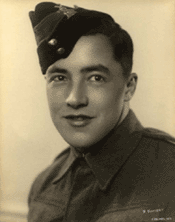Robert Denis Hubble
Son, brother, soldier Remembrance is a good thing, it is easy and it affords respect and credibility for the sacrifices of others, which, in a more comfortable yet detached world, is often taken for granted. It also provides a very expensive perspective on life; a perspective that should not be wasted. I grew up with a sepia photograph on the sideboard beside a large oak dining table. The image of that happy, proud face remains with me. I can still see it as clear as day even now, 55 years later; Robert Denis Hubble in his distinctive Norfolk-badged side cap watching me as I laid that big table for grandma.
Remembrance is a good thing, it is easy and it affords respect and credibility for the sacrifices of others, which, in a more comfortable yet detached world, is often taken for granted. It also provides a very expensive perspective on life; a perspective that should not be wasted. I grew up with a sepia photograph on the sideboard beside a large oak dining table. The image of that happy, proud face remains with me. I can still see it as clear as day even now, 55 years later; Robert Denis Hubble in his distinctive Norfolk-badged side cap watching me as I laid that big table for grandma.
κείμεθα, τοῖς κείνων ῥήμασι πειθόμενοι.
Go tell the Spartans, you who passeth by,
That here, obedient to their laws, we lie.
I was named after another; my father's brother, an uncle I never knew, Robert Denis Hubble. He was one of the 28,878, mostly young lads, too quickly turned men, who died fighting with the Fourteenth (Forgotten) Army in Burma and Northeast India. On June 14, 1944, at only 20 years old to the month, he lost his tomorrows so we could have our todays. My task, then, is to live a good life to the best of my ability, to earn the namesake, to live the life for which Denis was unable. But also, my task is to try and not put up with the things he died fighting against; cruelty, inhumanity, misbehaviour, and general bullshit. It makes for an interesting life sometimes, but at least it's a life, and one I've already been fortunate to live three times the length that which was afforded Denis.

 And also a mark in his home town at Walpole Park, Ealing, London, which I used to pass as a young tyke each day on my way to and from school. Such are a soldier's rewards for duty to King and country. Barely twenty he was.
And also a mark in his home town at Walpole Park, Ealing, London, which I used to pass as a young tyke each day on my way to and from school. Such are a soldier's rewards for duty to King and country. Barely twenty he was.
In this earlier photograph, shirtsleeves rolled, Denis looks like the only one who did any work that day; building the Anderson Shelter in the back garden at 79 Grange Road, Ealing, prior to the Blitz. Denis was fifteen in this photograph, with his sister, Anne's, hand resting on his younger brother, and my father, Ronald's shoulder, lower right. Who knew then that Denis would not see the end of the war?

Because we did not choose
To live and shame the land
From which we sprung.
Life, to be sure,
Is nothing much to lose,
But young men think it is,
And we were young.
— A E Housman
How the pendulum of war does swing, even at the heart of the family; one moment relief that the '44 "Baby Blitz" was over, and joy at finally liberating Rome after so many trying months, the next learning of a tragic family loss in the Far East – long considered the Forgotten War, except by those with family fighting there.
Bitterroot Valley Cabin - Raspberry Pines, Victor, Montana